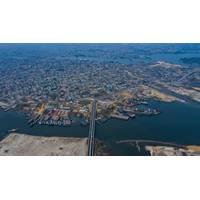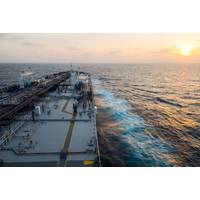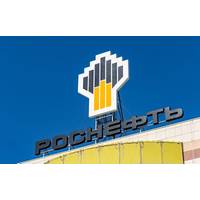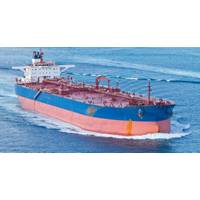Two Gasoline Tankers Divert from Nigeria

Two tankers carrying gasoline loaded in Antwerp, Belgium, have turned back to their load-port after initially being destined for Lagos in Nigeria, Refinitiv Eikon ship tracking and sources said on Friday.The two tankers, STI Symphony and Velos Diamantis, turned back in last week. The U-turns happened after Nigeria rejected other gasoline cargoes loaded in Antwerp for containing too much methanol.Reuters was not able to immediately confirm the methanol content in these two cargoes or why they turned back.Earlier this week…
Global Crude Market Finds Support From China Demand

China, the global oil market's lifeline this year, has stepped up purchases from exporters like Russia, the United States and Angola in recent weeks, while buyers elsewhere pare orders as coronavirus infections surge and fresh lockdowns are put in place.China, the world's largest importer of crude, is the only major buyer expected to see increased oil demand this year as the pandemic destroyed consumption globally.With China's imports expected to reach 12 million barrels per day (bpd) next year…
US Sanctions on Rosneft Trading Shifting Crude Flows

U.S. sanctions on Russian Rosneft's trading arm will disrupt a slice of global crude flows and may prompt refineries in Europe, India and the United States to shift purchases to other crude suppliers, traders said.The United States on Tuesday redoubled efforts to oust Venezuelan President Nicolas Maduro by barring U.S. dealings with Rosneft Trading S.A., a subsidiary of Russia's state oil major Rosneft, which Washington said provides him a financial lifeline. Russia…
Europe's Iranian Oil Purchases Set to Plummet
Key lender for Europe's oil purchases cuts credit from June 30. European refiners are cutting purchases of Iranian oil faster than expected as the U.S. prepares to reimpose sanctions on Iran, threatening a more severe impact than the last round of punitive measures in 2012 even though the EU has not joined in. Washington said that companies would have to wind down their activities with Iran by November 4 or risk exclusion from the U.S. financial system. Following President Barack Obama's sanctions in 2012, Europe imposed its own Iran oil ban.
Europe Gasoline/Naphtha-Cracks Hit two-year Low
Gasoline refining margins in northwest Europe dropped to a two-year low on Monday even as substantial volumes traded on European barge markets. The highest volume of gasoline barges in nearly seven years traded on Monday, brokers told Reuters, with 48,000 tonnes changing hands. Volumes were elevated due in part to the specification change from winter to summer grade gasoline. Some traders said that contango in gasoline is steep enough to support storing the fuel, particularly as some traders build up stocks of summer grade.
Saudi Aramco IPO on Track for 2018
A plan to list Saudi Aramco in 2018 is on track, senior Saudi officials said in Moscow on Thursday, as Saudi Arabia gears up to sign a string of investment agreements with Russia. The plan to float around 5 percent of Aramco in an initial public offering (IPO) is a centrepiece of Vision 2030, a wide-ranging reform plan to diversify the Saudi economy beyond oil which is being championed by Saudi Crown Prince Mohammad bin Salman. "Work is ongoing to list Saudi Aramco in 2018," Aramco's Chief Executive Amin Nasser said at an energy forum in Moscow.
Palmali Lodges $2 Bln Claim Against Lukoil's Litasco
Turkey-based Palmali, one of the biggest shippers in the Caspian region, said on Monday it had lodged a claim worth almost $2 billion against Litasco, the trading arm of Russian oil producer Lukoil, with the English High Court. "The claim concerns an alleged failure by Litasco S.A. to provide contractual quantities of cargo under long term contract between the companies," Palmali said in a statement sent to Reuters. Reporting by Nailia Bagirova; writing by Vladimir Soldatkin
Lukoil Mulls Sale of Litasco Trader, CEO Confirms
Vagit Alekperov, the Chief Executive Officer of Russia's No.2 oil producer Lukoil , confirmed on Wednesday that the company was considering the sale of Swiss unit Litasco. He also told reporters the board of Lukoil would take a decision on the Litasco sale in November. Earlier on Wednesday, industry sources told Reuters that Lukoil was considering selling Litasco because new U.S. sanctions on Russia would make it harder for the Geneva-based energy trader to raise new funds. (Reporting by Olesya Astakhova; writing by Vladimir Soldatkin; editing by Dmitry Solovyov)
Iran Raises Oil Exports to West, Almost on Par with Asia

Iran's oil exports to the West surged in May to their highest level since the lifting of sanctions in early 2016 and almost caught up with volumes exported to Asia, a source familiar with Iranian oil exports said. Iran, which used to be OPEC's second biggest oil exporter, has been raising output since 2016 to recoup market share lost to regional rivals including Saudi Arabia and Iraq. While many Asian nations continued to purchase oil from Iran during sanctions, Western nations halted imports, halving Iran's overall exports to as little as one million barrels per day (bpd).
Iran Plays Hardball with European Oil Buyers, Slowing Exports
Iran has managed to sell only modest volumes of oil to Europe since the lifting of sanctions seven weeks ago and several former buyers are staying away, citing legal complications and Tehran's reluctance to sweeten terms to win back customers. Tehran had been unable to sell crude to European firms since 2012 when the EU imposed sanctions over its nuclear programme, depriving it of a market that accounted for over a third of its exports and leaving it relying completely on Asian buyers.
Iran Hopes to Raise March Oil Exports
Iran, OPEC's No. 3 producer, is expected to raise its oil exports in March to around 1.65 million barrels per day from 1.5 million bpd a month earlier on the back of higher crude shipments to Europe, two industry sources told Reuters on Thursday. State-run National Iranian Oil Co. (NIOC) is expected to ship around 250,000-300,000 bpd to Europe this month after it finalised term deals with France's Total and Spanish refiner Cepsa, effective from March 1, said the sources, who are familiar with Iran's exports.
Foreign Oil Firms to Settle Iran's Debt in Euros
Iran's oil minister said foreign oil companies that owe his country billions of dollars are likely to settle their debts in euros. Greece's Hellenic Petroleum, Italy's Saras and Royal Dutch Shell owe Iran about $4 billion which will be paid back in euros, Iranian Oil Minister Bijan Zanganeh was cited by the ministry's news agency Shana as saying on Tuesday. Shell has said it was ready to settle its debts to Iran, but Greece's Hellenic Petroleum is having trouble to pay Iran back and "alternative methods are being worked out", Zanganeh said, according to Shana.
Cepsa Resumes Iranian Oil Supplies to Spain
Spanish refiner Cepsa will ship a 1-million barrel cargo of Iranian oil to its refineries, according to vessel agents' data and market players' information on Wednesday. Global oil markets, already oversupplied, have been jittery over the return of Iranian oil after the lifting of international sanctions imposed over Tehran's nuclear programme. According to Reuters shipping data, epsa has chartered the suezmax Monte Toledo which will load at Iran's Kharg Island for delivery to the Spanish ports of Huelva and Algeciras.
Gasoline Cargoes Sail to Iran, Crude Exports Still Tough
Major oil firms and trade houses are gradually resuming energy trading with Iran but efforts remain very cautious and often face huge legal obstacles, meaning a post-sanctions return to full-scale activity will take weeks if not months. Trading sources told Reuters major trading houses Gunvor and Vitol have each delivered several cargoes of gasoline into Iran in recent days. Gunvor and Vitol declined to comment. Meanwhile, Swiss trading house Litasco of Russian oil…
Urals Prices Weaken in Med, Baltic
Russian Urals crude price differentials weakened in the Mediterranean and the Baltic due to ample supplies, traders said on Thursday. In the Platts window, Litasco sold to Shell a 80,000 tonne cargo in the Mediterranean loading on Jan. 18-22 at a discount of $1.45 a barrel to dated Brent, some 30-35 cents a barrel weaker than previous levels, traders said. Vitol unsuccessfully offered its Jan. 19-23 cargo at a discount of $1.45 a barrel, market participants said. Ample…
Urals Weakens Further in Baltic
Russian Urals crude differentials continued to slide in the Baltic on Thursday amid a flurry of activity with softer refining margins, pushed down by higher oil prices, still keeping buyers at bay. In the Platts window, Statoil bought a 100,000-tonne cargo from Glencore for loadings on Oct. 18-22 in the Baltic at dated Brent minus $2 a barrel, some 20 cents weaker than on Wednesday, traders said. Litasco, Total and Vitol have found no buyers with offers of minus $1.80, $1.75 and $1.85 to dated Brent correspondingly.
Singapore's Record Fuel Stocks Move to Floating Storage
Record high stocks of fuel oil in Singapore are pushing traders to store the shipping and feedstock fuel into tankers temporarily as demand slows regionally. At least seven very large crude carriers (VLCCs) have been provisionally fixed to store fuel oil on short-term time charters, traders and shipbrokers said. Lower oil prices have boosted refinery profits over most of this year, in turn driving refiners to maximise run rates and increase the supply of fuel oil in the region, traders said.
Med Crude-Russian Urals Edges Lower in Med, Baltic
Russian Urals crude weakened in the Mediterranean and in the Baltic on Friday, while trading activity was limited ahead of a long holiday weekend in Britain, traders said. In the Platts window, Vitol sold an 80,000-tonne cargo of Urals from Novorossiisk on Sept. 13-17 to Exxon at dated Brent minus $0.85 a barrel on a DES basis, traders said. That was 15 cents below the latest price estimates for the grade. Before the window Vitol offered a very prompt Aframax of Urals crude for loading Sept. 3-4 down to dated Brent minus $1 a barrel, but found no buyer and withdrew its offer.
Med Crude-Russian Urals Weakens in Mediterranean
Russian Urals crude weakened in the Mediterranean on Monday and paper swaps showed potential for the grade to lose further ground in August. In the Platts window, Litasco offered an 80,000 tonne cargo in the Mediterranean at dated Brent minus 65 cents, some 20 cents weaker than previous price estimates, but found no buyers, traders said. Urals August swaps showed prices could weaken to dated Brent minus 60 to 75 cents in the Mediterranean and by some 10-15 cents in the Baltic from the current levels of dated Brent minus $1.20-1.30 a barrel.
Urals Stronger in Baltic Due to Low Volumes
Russian Urals crude strengthened on Friday after a loading programme showed an expected drop in exports from the Baltic in May. In the Platts window, Trafigura sold a Urals cargo in the Baltic to Litasco for May 10-14 delivery at dated Brent minus $1.05 a barrel, some 40 cents stronger than previous price estimates. Exports from the Baltic Sea port of Ust-Luga are seen falling to 2 million tonnes in May, down from 2.334 million tonnes in April. The loading schedule from neighbouring Primorsk was not yet available on Friday.
